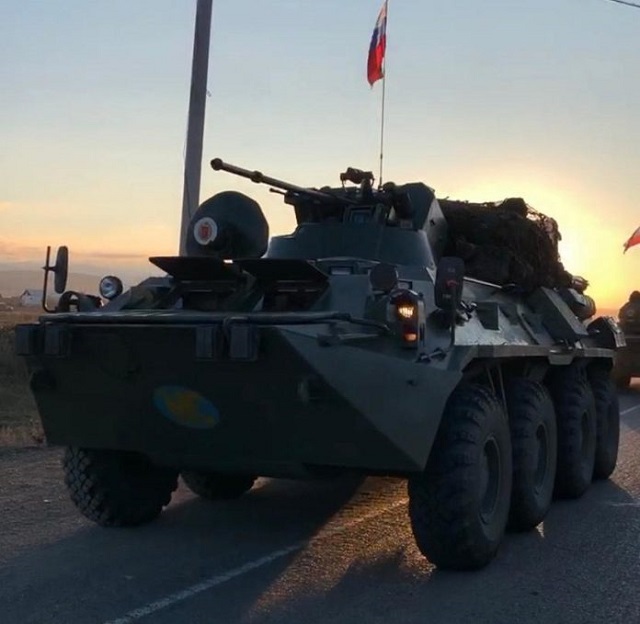By Raffi Elliott
Special to the The Armenian Mirror-Spectator
YEREVAN — Artsakh officials insist that tourists and foreign press are still welcome as details on recent reports of Russian peacekeepers preventing foreign journalists from entering the republic continue to emerge.
Read also
The Artsakh authorities’ traditionally straightforward entry requirements for foreign press, and relatively freer media environment, have long provoked the ire of Baku, which has repeatedly attempted to stifle international coverage of war crimes committed by Azeri soldiers both during and after the recent war. Azerbaijan, which ranks between Bahrain and Yemen as one of the world’s most repressive countries, maintains a black list for foreign journalists, even going so far as to press criminal charges against reporters.
Rumors that Russian peacekeepers, probably acting under pressure from Baku, had begun clamping down on cross-border travel into Artsakh and restricting media freedom sparked concerns over the potential erosion of the unrecognized republic’s sovereignty in the wake of last year’s bloody conflict which left at least 3,500 Armenian and an unknown number of Azerbaijanis dead. Azerbaijan has already attempted to assert its jurisdiction on the republic by hindering access to the Armenian Dadivank monastery and condemning the visit of Armenian government officials to Stepanakert.
Allegations made by former President Serzh Sargsyan’s son-in-law Mikael Minasyan — currently in exile avoiding charges of bribery and embezzlement of government property in Armenia — that a supposed secret “verbal” clause of the November 10 armistice agreement entitles Azerbaijan final approval on entry into Artsakh, has been firmly denied by officials in Stepanakert. Last week, Artsakh Foreign Minister David Babayan insisted that “Artsakh never asks and will never ask for Azerbaijan’s permission for anyone’s entry to the republic.”
Minasyan, better known in Armenia by the sobriquet “Mishik,” has been the source of a number of unsubstantiated claims about the cease-fire agreement which ended the war. Virtually all of these have been refuted by authorities in Stepanakert and Yerevan, or exposed as fabrications.
Still, the Artsakh MFA did eventually issue an update to its entry procedures last week. Citing “security reasons,” visa applications will also be shared with the Russian peacekeeping contingent. The entire process is expected to take up to three business days. Previously, visa applications could either be submitted at the representation in Yerevan or in person at the MFA in Stepanakert upon arrival.
Babayan explained that these temporary security measures were a response to what he claims to be the continued threat of foreign islamist fighters in the area who had been flown in by Turkey during the war. Several Armenian civilians have been abducted by Azerbaijani forces since the ceasefire took effect, including the Lebanese-born Maral Najarian, who remains in captivity despite international pressure for her release.
Speaking to the Mirror-Spectator on Tuesday, February 16, a representative of the Artsakh consular office in Yerevan acknowledged several incidents in which foreign journalists were initially denied entry into Artsakh by Russian peacekeepers, adding that they were all eventually let in “once the situation had been clarified.”
This account echoes earlier comments by Artsakh Presidential Chief of Staff Artak Beglaryan that such cases were the results of miscommunication between the Artsakh MFA and Russian peacekeepers. Asked about an incident in which a foreign journalist of Armenian origin was barred entry into Artsakh while a local news crew travelling with him was allowed to continue reporting unimpeded, Beglaryan blamed delays in transmitting updated lists of visa approvals to the peacekeepers manning the checkpoints, stating “The names of these journalists weren’t transmitted to the Russians because the system was still being introduced.” Beglaryan insists that the issue has since been resolved.
The Artsakh Ministry of Foreign Affairs says its visa application procedure remains open to international journalists provided that proper press accreditation is presented. However, the representative could not guarantee that reporters wouldn’t be turned away at the border even with the proper documentation being granted. “The best way to avoid potential mishaps is to submit applications sooner rather than later to ensure that the lists are updated before the journey,” the Ministry said.
Photo Caption: Russian peacekeepers entering Karvajar on November 13 (photo Raffi Elliott)

























































